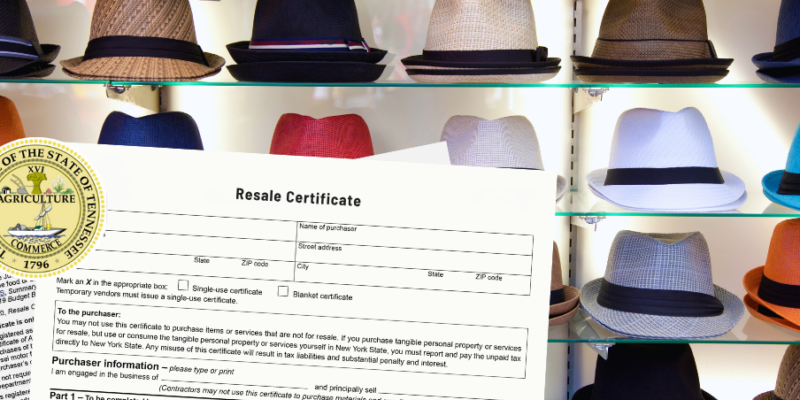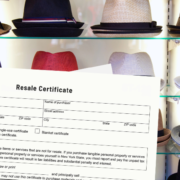
Apply For a Resale Certificate in Tennessee — Why It’s Simpler Than You Think
Let’s clear the air: paperwork often feels like a giant roadblock. Most business owners imagine long forms, hidden rules, and endless waiting. But here’s the twist — when you apply for a resale certificate in Tennessee, the process is far less intimidating than you might expect. The certificate is your golden ticket to buying products tax-free if you’re reselling them, and it can save you serious money. What surprises most people is how streamlined the application can be once you know what to prepare. Instead of treating it like a chore, think of it as setting up a simple system that will pay off over and over again. Vendors will ask for it, tax officials expect it, and your bookkeeping will look cleaner with it. We’re going to strip away the jargon and explain it step by step, with plain examples so that you can feel ready and in control.
- Skip the confusion.
- Know exactly what’s needed.
- Save money every single month.
How To Navigate the Application Process Without Stress
Start by knowing the goal: the state wants to confirm you’re buying goods strictly for resale. That’s it. You’ll need a Tennessee sales tax account, which acts like the foundation of your resale status. From there, the application requires details like your business name, address, and tax ID. Don’t have an EIN? Sole proprietors can use their Social Security number instead, which makes the process just as valid. The form also asks what type of products you’ll resell — it doesn’t need to be overly detailed, but it should be accurate. Once you’re ready, the fastest way to apply is online. The system guides you through screens and double-checks for missing info. At the end, you’ll either get immediate approval or be asked for follow-up documentation. Always save a copy of the final submission for your records. Mistakes are common, but the good news is that most can be fixed quickly by contacting the Department of Revenue.
- Create or confirm a sales tax account.
- Gather your EIN or SSN.
- Describe your resale products clearly.
- Submit online for speed and accuracy.
What Documents Make or Break the Application
Documents are the backbone of your application, and having them ready is what separates a smooth process from a frustrating one. First, your EIN or SSN identifies your business to the state. Next, proof of your business address ensures they can contact you easily. You’ll also want to have invoices, supplier agreements, or even draft contracts that demonstrate your active involvement in resale. These pieces make it clear that you’re not just applying “just in case.” If you’re registered with local authorities, keep copies of those permits as well. One overlooked detail is bank account verification — sometimes requested to confirm your financial activity matches your application. Storing all of this in a digital folder will save you time, especially if the state asks for clarifications. Missing documents slow approval, while complete ones usually lead to fast acceptance. Please don’t underestimate this step, because it’s often the difference between waiting weeks or getting approved almost instantly.
- EIN or SSN on hand.
- Proof of business address.
- Supplier agreements or invoices.
- Local permits and licenses.
Why Maintaining and Using the Certificate Matters Long-Term
Getting approved is only the beginning. Once you hold the certificate, the real responsibility is using it correctly. That means handing it to vendors only when buying goods for resale — not office supplies, not personal items, not services unless resold. You’ll want to keep a log of which vendors received your certificate, as it helps during audits. Filing sales tax returns properly is another part of the puzzle. Even though you buy tax-free upfront, you still collect and remit sales tax from customers. Forgetting that step could lead to penalties and back payments. Also, don’t let your certificate gather dust. Review it annually and update it if your business changes ownership, moves, or expands its product line. Cancel it if you shut down the business to avoid liability. Responsible use keeps you in good standing and proves to suppliers that you’re a trustworthy partner in resale.
- Provide goods to vendors only for resale.
- Log vendors who receive the certificate.
- File sales tax returns on time.
- Update or cancel if your business changes.
Wrapping Up and Taking Action
Here’s the truth: applying isn’t the hard part. Staying organized and consistent is where most businesses slip up. We’ve walked through the essentials — applying, preparing documents, and maintaining the certificate responsibly. Once you follow these steps, the resale certificate shifts from being “one more form” into a valuable tool that saves you money and builds trust with your suppliers. Our advice? Don’t wait until tax season panic hits. Gather your details, apply online, and keep everything neat in a simple folder. That way, if questions pop up later, you’ll have answers ready. We want to help you set up a system that lasts, not just a quick fix. Now’s the best time to take control, get your certificate in place, and run your business with confidence.












